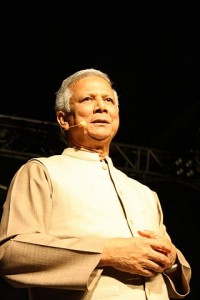Who is Muhammad Yunus?
Wikipedia, headword “Muhammad Yunus”, version edited at 18:11, 24 October 2009, accessible at en.wikipedia.org:
Muhammad Yunus (Bangla: মুহাম্মদ ইউনুস, pronounced Muhammôd Iunus) (born 28 June 1940) is a Bangladeshi banker and economist. He previously was a professor of economics where he developed the concept of microcredit. These loans are given to entrepreneurs too poor to qualify for traditional bank loans. Yunus is also the founder of Grameen Bank.
Wikipedia, Stichwort “Muhammad Yunus”, Version vom 22. August 2009 um 22:40 Uhr, abrufbar unter de.wikipedia.org:
Muhammad Yunus (মুহাম্মদ ইউনুস, Muhāmmad Iunus; * 28. Juni 1940 in Chittagong) ist ein bangladeschischer Wirtschaftswissenschaftler. Er ist Gründer der Mikrokredite vergebenden Grameen Bank und damit einer der Begründer des Mikrofinanz-Gedankens. 2006 wurde er mit dem Friedensnobelpreis ausgezeichnet.
A World without Poverty!
Unlike a bank he went to the people. He did not judge the people by what they are or where they have gone wrong. He looked where they wanted to go to. And especially he has had a focus on women. To remind you banks give credit to a man but not necessarily to a woman.
By doing things that banks thought would be a FAIL he proved that he is a WIN. We also recall the banks were a FAIL and the cause of the financial crisis 2007–2009 while Yunus has proved to be a WIN.
What did he do different? He claims he learned from the banks. Yunus had a close look at banks and how they operate in order not to do it alike but the opposite way. People go to banks. Yunus went to the people. Traditional bank loans are given to men. Yunus therefore set his focus on women. Banks prefer wealthy customers. Yunus was successful with the poor customers. Banks wanted lawyers. Yunus could do without.
The speech begins with Yunus telling a story in a rather grandfatherly manner of a very skilled woman crafty at making beautiful tools from babboo. He talks with the woman in order to find out more about her situation to find out that the current concept is not apt for a successful business. She needed to borrow money in order to buy the raw material. There was not the possibility to use cheaper material. Yunus made it his challenge to think of a way to change the situation and break the cycle of the woman having only the necessary money for keeping up her livelihood.
What Yunus decided to do was a brave step. He gave loans to several people in the village and awaited the result. After the success he decided to involve banks in his plans only to find out that they would not do it just like that. Showing them that it works was not enough because they had rules. Rules that did not allow bankers to give loans to poor people which makes the banks directly responsible for the root of the problem. So in the first run Yunus had to stick to their regulations hoping the success of the project would persuade them to change their mind and proof them wrong. Even the first successful trial left them unbelieving yet when the experiment was repeated in several other villages.
Yunus did not change the world but he made it a bit more worthwhile living on this world. That is more than most of us can say about themselves.
Have a look at gallery/category on commons.wikimedia.org that I created for this event.
Weblinks
- vimeo.com Prof. Muhammad Yunus public speech Wiesbaden
- www.grameencreativelab.com
- www.grameen-info.org Grameen Bank – Banking for the poor
- www.muhammadyunus.org Muhammad Yunus Hompage
- twitter.com grameencl
- www.faz.net
- www.fondsvermittlung24.de Mit Kleinkrediten gegen Armut. Die Mikrofinanz-Fonds


Ich habe das Buch „Banker to the poor“, zusammen von Yunus und Alan Jolis veröffentlicht, gelesen. Dem sein Erfolg ist das grösste, was man sich in der Entwicklungshilfe nur vorstellen kann. Es hat Ihm aber seine Ehe gekostet. Eigentlich ist die Zahlungsmoral der Armen miserabel. Ich leihe hier prinzipiell niemanden etwas, wenn er nicht einen Wertgegenstand (z.B. Handy, Gaszylinder) hinterlegt. Als ich die Story das erste mal hörte, dachte ich es ist Humbug. Kann ich den Bankern nicht verübeln, dass die es nicht glauben wollten. Wer bei Yunus jedoch zurückzahlt, kann einen höheren Folgekredit (z.B. für Hausbau) erwarten. Und wöchentlich !!! holt jemand das Geld ab. Die Verwaltungskosten sind deshalb so extrem, dass er um die 30% Zinsen nehmen muss. Nicht zuviel, wenn man bedenkt, dass damit Ausgabendisciplin in der Familie hergestellt wird. Ein wahrlich bewundernswerter Mann.
Ich bin erstaunt, dass Du auf Ihn aufmerksam wurdest. Ich hab sein Buch erst vor weniger als einem Jahr in die Hände bekommen.